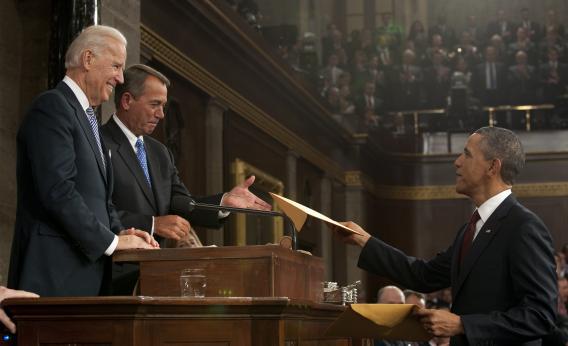What to make of last night’s State of the Union? Well I see three big categories: The good, the bad, and the ugly.
The good: Almost everything the president touched on briefly sounded about right to me. His vision for K-12 and for higher education are both sound and well-expressed. I know some people have gotten impatient for more thunderous rhetoric on these topics, but the reality is that there’s a lot that U.S. education is doing right sitting alongside a lot of problems, and so you need to talk about it clearly but carefully and the president did. Mortgage refinancing is a great idea. I don’t fully understand the contours of his foreclosure fraud proposal, but it’s an improvement over what looked like previous White House indifference. The energy section initially bugged me, but I thought they landed it in a smart way. Infrastructure: Check. Deficit reduction must be balanced and long-term: Check. Tax progressivity: Check.
The bad: Through a long stretch of the speech the president went all-in on a confused mercantalist vision. That’s what I wrote my column about, and it was really bad. Misguided policy ideas supported by faulty logic. I think Gene Sperling must have been on vacation when they drafted the speech or something. Smart progressive ideas about mitigating the problems with globalization were nowhere to be seen and instead we got protectionism for uncompetetive tire-makers.
The ugly: The president tried to paint an optimistic picture of the economy going forward. “In the last 22 months, businesses have created more than three million jobs,” he said “last year, they created the most jobs since 2005.” Politifact, apparently driven insane by staring too deeply into the eyes of Paul Ryan, chose to object that had the president said something different from that it would have been an inaccurate claim:
In his remarks, Obama described the damage to the economy, including losing millions of jobs “before our policies were in full effect.” Then he describe [sic!] the subsequent job increases, essentially taking credit for the job growth. But labor economists tell us that no mayor or governor or president deserves all the claim or all the credit for changes in employment.
Really? His exact words were “businesses have created more than three million jobs … they created the most jobs since 2005.” That doesn’t sound like a president trying to say that he, personally, deserves credit for everything that’s happened. Strangely they missed the real boat here which is that the three million jobs created in 2011, through indeed the most since 2005, is actually a low number for an economy with a massive pool of idle labor that needs catch-up growth to regain full employment. What the president said was true, but just underscores the fact that the labor market has been ugly on both the downswing and the upswing.
